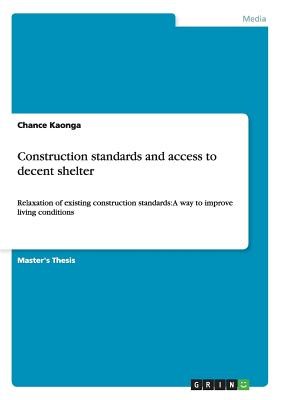
- We will send in 10–14 business days.
- Author: Chance Kaonga
- Publisher: GRIN Verlag
- Year: 2015
- Pages: 120
- ISBN-10: 3656885826
- ISBN-13: 9783656885825
- Format: 14.8 x 21 x 0.7 cm, softcover
- Language: English
- SAVE -10% with code: EXTRA
Construction standards and access to decent shelter (e-book) (used book) | bookbook.eu
Reviews
Description
Master's Thesis from the year 2012 in the subject Art - Architecture / History of Construction, grade: A+, Leuven Catholic University, language: English, abstract: This research examines the standards of construction and regulations in Zambia, in light of their effect on the attainment of the acclaimed international rights to adequate shelter for all and development of sustainable human settlements in an urbanising world (UNCHS, 2003). As argued by Rafael Tuts (1996), that the prohibitively high building and planning standards are often considered as one of the main obstacles to the provision of low-cost housing in developing countries. He further stated that the more and more agencies and stakeholders advocate the relaxation of these standards; the major motivation is the anticipated initial cost reduction . The statutes governing the development of infrastructure have a genesis from the British system and fundamentals; Zambia was a British colony until 1964. The principal law governing the development control is Chapter 283 of the Laws of Zambia; The Town and Country Planning Act. As the population of the country grows, the number and size of squatter settlements correspondingly increase. Most of the houses in the squatter settlements are built using construction materials and methods that are not recognised by the statutes. These settlements lack basic infrastructure services such as generous access roads, piped water, sanitation and electricity. The plot lay-outs are usually irregular and of unsecure tenure. The focus will be on examining the low and medium cost housing schemes implemented thus far and access to such housing over the years. The intervention of some civil society organisations to help provide affordable and decent shelter to the poor and disadvantaged people shall also be delved into. The methods of house production shall be evaluated to determine their performance and appropriateness and adequacy. Focus shall also be on the construction met
EXTRA 10 % discount with code: EXTRA
The promotion ends in 18d.13:39:55
The discount code is valid when purchasing from 10 €. Discounts do not stack.
- Author: Chance Kaonga
- Publisher: GRIN Verlag
- Year: 2015
- Pages: 120
- ISBN-10: 3656885826
- ISBN-13: 9783656885825
- Format: 14.8 x 21 x 0.7 cm, softcover
- Language: English English
Master's Thesis from the year 2012 in the subject Art - Architecture / History of Construction, grade: A+, Leuven Catholic University, language: English, abstract: This research examines the standards of construction and regulations in Zambia, in light of their effect on the attainment of the acclaimed international rights to adequate shelter for all and development of sustainable human settlements in an urbanising world (UNCHS, 2003). As argued by Rafael Tuts (1996), that the prohibitively high building and planning standards are often considered as one of the main obstacles to the provision of low-cost housing in developing countries. He further stated that the more and more agencies and stakeholders advocate the relaxation of these standards; the major motivation is the anticipated initial cost reduction . The statutes governing the development of infrastructure have a genesis from the British system and fundamentals; Zambia was a British colony until 1964. The principal law governing the development control is Chapter 283 of the Laws of Zambia; The Town and Country Planning Act. As the population of the country grows, the number and size of squatter settlements correspondingly increase. Most of the houses in the squatter settlements are built using construction materials and methods that are not recognised by the statutes. These settlements lack basic infrastructure services such as generous access roads, piped water, sanitation and electricity. The plot lay-outs are usually irregular and of unsecure tenure. The focus will be on examining the low and medium cost housing schemes implemented thus far and access to such housing over the years. The intervention of some civil society organisations to help provide affordable and decent shelter to the poor and disadvantaged people shall also be delved into. The methods of house production shall be evaluated to determine their performance and appropriateness and adequacy. Focus shall also be on the construction met


Reviews